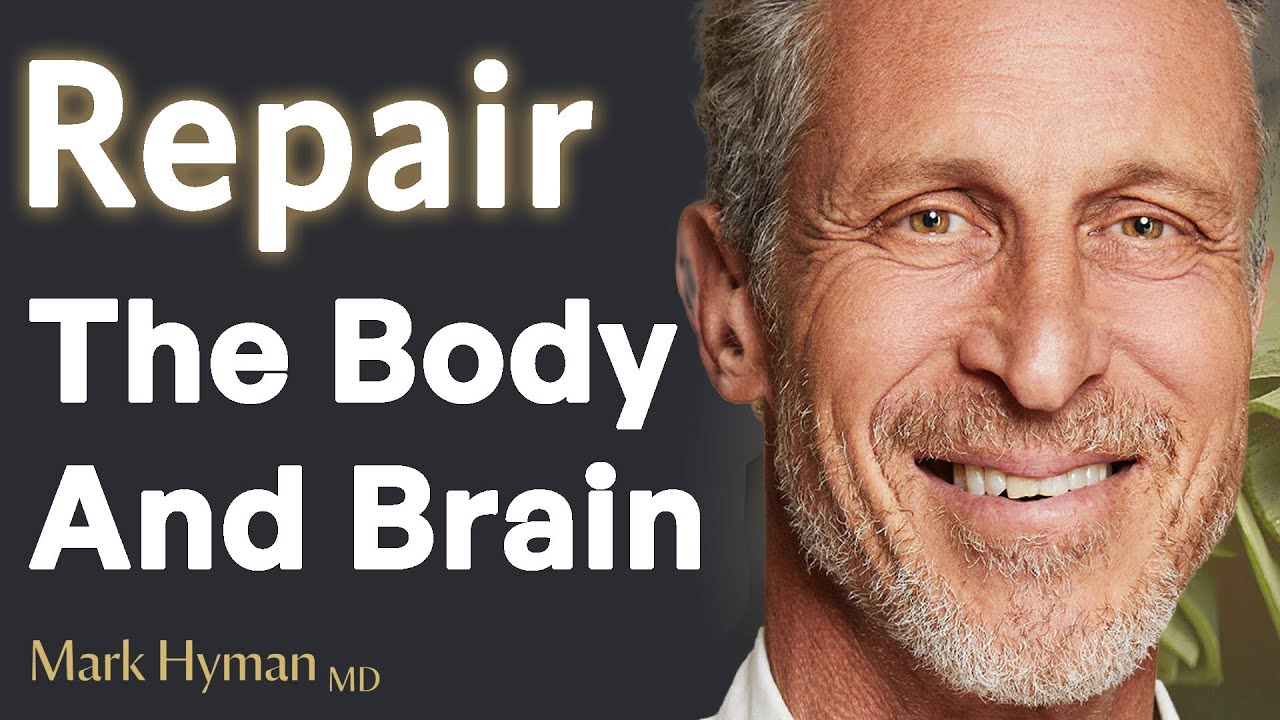Dr. Mark Hyman shares insightful strategies to help you reverse aging after the age of 40. With a focus on shifting the way you perceive aging, this article will illuminate recent advancements in longevity science and technology that can potentially turn back your biological clock. You’ll discover how your diet and lifestyle choices can influence your genetic expression and overall aging process, along with groundbreaking research connecting nutrition to aging.
You’ll also learn about a practical six-step protocol designed to empower you in your journey toward a younger, healthier self. Each recommendation focuses on holistic lifestyle adjustments that can significantly impact your biological age, all while highlighting the importance of managing inflammation and maintaining a balanced, nutrient-rich diet. This comprehensive approach aims not just to add years to your life but to enhance the quality of those years.

Understanding Aging
Defining Biological Age vs. Chronological Age
Aging is often discussed in terms of chronological age—the number of years you’ve been alive. However, it’s crucial to differentiate this from biological age, which reflects the condition and functioning of your biological systems. Biological age can indicate how well your body is handling the passage of time, and unlike chronological age, it can be influenced and modified by various lifestyle choices and environmental factors. Focusing on biological age allows you to take proactive steps toward healthier aging, potentially reducing your biological age and boosting your overall health and vitality.
The Impact of Biological Systems on Aging
Your biological systems—including your immune system, cellular health, and hormonal balance—play a significant role in determining how you age. For instance, the decline of your immune system can make you more susceptible to diseases and age-related issues. By understanding the interplay between these systems and the aging process, you can take steps to support them, allowing your body to remain youthful and energetic for longer.
The Role of Lifestyle and Environment in Aging
Your lifestyle choices—what you eat, how much you exercise, and even how you handle stress—are key factors that influence your biological age. Similarly, your environment, such as exposure to toxins and pollutants, can accelerate aging. Taking care of your body through nutritious diets, regular physical activity, and minimizing harmful environmental exposures can significantly slow down the aging process. It’s about creating a balanced environment that promotes youthful living.
The Aging Process: Root Causes
Identifying Imbalances Leading to Aging
Aging is often driven by various imbalances that accumulate over time. These can stem from poor diet, environmental toxins, stress, and inadequate sleep, leading to a cascade of negative health effects. Recognizing these imbalances is the first step toward reversing aging. By identifying and addressing them, you can help restore balance to your biological systems, ultimately helping you feel better and age more gracefully.
Influence of Toxins and Stress on Aging
Everyday life exposes you to numerous toxins—environmental pollutants, processed foods, and even stressors that can contribute to chronic inflammation and accelerate aging. Stress can impact your body at cellular levels, leading to long-term consequences like reduced immune efficiency and increased susceptibility to chronic diseases. It’s important to mitigate these toxins and stressors in your life to foster a better aging process.
The Accumulation of Inflammation and Its Impacts
Inflammation is one of the hallmarks of aging. Chronic low-grade inflammation can lead to various health challenges, such as cardiovascular disease, arthritis, and neurodegenerative disorders. Over time, this inflammation accumulates, causing damage to your cells and tissues. It’s essential to identify sources of inflammation in your life—be it through diet, lifestyle, or stress—and find methods to reduce it for healthier aging.
Exposome: The Hidden Factor in Aging
Understanding the Exposome Concept
The term “exposome” refers to the totality of environmental exposures that an individual encounters over their lifetime, encompassing everything from diet and physical activity to pollutants and stress. Understanding your exposome is essential, as these factors interact with your genes, potentially influencing your biological age. By becoming more aware of what you’re exposed to daily, you can make choices that promote healthier aging.
How Environmental Choices Affect Biological Aging
Your daily choices regarding your environment can significantly impact how you age biologically. For example, living in areas with high pollution may expose you to harmful substances that could accelerate biological aging. Conversely, opting for a cleaner, healthier living environment and making conscious decisions about your exposures can potentially slow down this process, thereby maintaining your vitality over the years.
Beneficial Exposures that Can Reverse Aging
Not all exposures are bad! Certain environmental factors can have beneficial effects on your biological age. Engaging in outdoor activities, spending time in nature, and fostering strong social connections can positively influence your biological systems. By consciously integrating these beneficial exposures into your life, you can enhance your overall well-being and potentially even reverse some aspects of biological aging.
The Role of Epigenetics in Aging
Understanding Gene Expression and Aging
Epigenetics is the study of how your environment and choices affect gene expression without altering the DNA sequence itself. This field of research highlights that while you cannot choose your genes, you can influence how those genes behave. Factors like diet, exercise, and stress levels can either promote or inhibit the activation of certain genes linked to aging, meaning you have the ability to exercise control over your biological clock.
Lifestyle Choices that Influence Genetic Factors
Your lifestyle choices play a vital role in shaping your epigenetic landscape. For example, consuming a nutrient-dense diet filled with antioxidants can encourage the expression of genes that promote repair and regeneration. Similarly, regular physical activity and stress management techniques can significantly affect gene expression tied to inflammation and immune response. Making conscious choices can lead to positive changes in how your genes express and, ultimately, how you age.
Stress’s Role in Gene Expression and Aging
Stress is a double-edged sword. While some stressors can be beneficial, chronic stress can lead to negative epigenetic changes. This can result in the activation of genes that promote inflammation and aging, particularly as they relate to your immune function and cellular repair. Managing stress through mindfulness practices, adequate sleep, and healthy relationships can help mitigate these effects, paving the way for healthier aging.

Key Factors Influencing Aging
Inflammation and Its Effects on Aging
As previously highlighted, inflammation is a critical factor in the aging process. Its effects can loom large, contributing to conditions like Alzheimer’s disease, heart disease, and type 2 diabetes. Maintaining control over inflammation through dietary choices, exercise, and stress management can help you mitigate these risks and lead to a more vital life as you age.
The Decline of the Immune System
The immune system naturally declines as you age—a process known as immunosenescence. This decline can leave you more vulnerable to infections, chronic diseases, and autoimmune issues. By supporting your immune system with a healthy lifestyle, including adequate sleep and a diet high in antioxidants and nutrients, you can boost your defenses and promote healthier aging.
Nutrient Deficiencies and Chronic Diseases
Nutrient deficiencies are more common as you age and can significantly impact your health negatively. Chronic diseases often stem from a lack of essential nutrients, which can further accelerate aging. Ensuring your diet is rich in vitamins, minerals, and other nutrients is vital. Monitoring your nutrient intake and supplementing where needed can lay a solid foundation for optimal aging.
A Six-Step Protocol for Reversing Aging
Step 1: Optimizing Diet for Better Aging
The foundation of your biological age lies in your diet. Focus on consuming nutrient-dense, whole foods rich in essential vitamins and minerals, particularly those that support methylation, which plays an essential role in gene expression. Foods like leafy greens, nuts, seeds, and fatty fish can help promote a healthier biological age.
Step 2: The Importance of Regular Exercise
Regular exercise is non-negotiable when it comes to reversing biological aging. Aim for at least 150 minutes of moderate aerobic activity weekly, complemented by strength training. Exercise improves muscle mass, enhances metabolic function, and supports cardiovascular health—all of which can contribute to a younger biological age.
Step 3: Enhancing Sleep Quality
Quality sleep is vital for your overall health and well-being, particularly as it supports cellular repair and immune function. Prioritize consistent sleep patterns, create a relaxing bedtime routine, and consider environmental factors like light and noise to foster a restorative sleeping environment.

Continued Six-Step Protocol Discussion
Step 4: Stress Management Techniques
Incorporating stress management techniques into your daily routine can have a profound impact on your aging process. Practices like meditation, yoga, and deep-breathing exercises can help you manage stress effectively, promoting better gene expression while also boosting your immune system and overall mental health.
Step 5: The Importance of Hydration and Nutrition
Staying hydrated is a crucial aspect of healthy aging. Water helps maintain cellular function, supports digestion, and flushes toxins from the body. Combined with a balanced diet rich in essential nutrients—like vitamins D, B6, B12, and Omega-3s—you set a solid foundation for longevity and well-being.
Step 6: Supplementation Strategies for Healthy Aging
Consider supplementation to support your dietary efforts. Certain supplements, such as those focusing on DNA methylation and essential nutrients lacking in your daily intake, can help enhance your biological age. It’s wise to consult a healthcare professional before diving into supplementation to tailor the regimen to your specific needs.
Scientific Evidence Supporting Strategies
Recent Research in Dietary Influences on Aging
Recent studies have uncovered significant links between dietary practices and biological aging. From the benefits of plant-based diets to specific nutrients that promote cellular health, the evidence is compelling. Implementing these dietary changes can yield remarkable shifts in your biological age, leading to improved health outcomes.
Studies Showing Biological Age Reversals
Research has also demonstrated the potential for reversing biological age through lifestyle changes. Results show that individuals engaging in healthier diets, exercise, and stress management have achieved noticeable improvements in their biological markers within a relatively short time. These studies underscore the idea that with the right approaches, you can indeed turn back the clock.
The Importance of Evidence-Based Approaches
Adopting evidence-based strategies to combat aging is key. It’s about relying on scientific findings rather than just anecdotal advice. Consulting with health professionals and staying informed about the latest research can empower you to make choices that genuinely contribute to your vitality and longevity.

A Holistic Approach to Longevity
Integrating Diet, Exercise, and Mental Health
A holistic approach to aging encompasses more than just diet and exercise—it includes mental health as well. Integrating practices that foster emotional well-being, like community engagement and mindfulness, complements physical health efforts, creating a well-rounded approach to longevity.
The Concept of Quality of Life in Aging
Quality of life is paramount as you age. It’s not only about living longer but about living well. Engaging in activities that bring joy, fostering relationships, and pursuing passions can significantly enhance your quality of life as you age. Focus on these aspects to ensure that your later years are filled with fulfillment and happiness.
Creating a Balanced Lifestyle for Longevity
Creating a balanced lifestyle is crucial for long-term health. This means intertwining healthy eating, regular physical activity, proper hydration, and effective stress management into your daily routine. By recognizing and addressing these areas, you can promote longevity and preserve your youthfulness as the years progress.
Conclusion
Reframing Aging: From Years to Vitality
It’s time to change the narrative surrounding aging. Instead of viewing it as a decline, consider how you can reframe it as an opportunity to increase vitality. By focusing on biological rather than chronological age, you empower yourself to take charge of your health and well-being.
Emphasizing the Quality of Life in Older Age
As you age, remember that the quality of your life matters most. Take steps to foster happiness, fulfillment, and vitality in your later years. Engaging with loved ones, pursuing interests, and maintaining physical health all contribute to a joyful life, irrespective of your age.
Encouraging a Positive Perspective on Aging
Lastly, encourage a positive perspective on aging for yourself and those around you. Embrace the opportunities that come with each passing year, and focus on what you can do to support your commitment to a vibrant, healthy life. Aging can be a beautiful journey when approached with positivity and proactive strategies—after all, the best is yet to come! Stem cells have the extraordinary ability to repair and regenerate damaged cells, making them a promising solution for many chronic conditions. However, traditional stem cell therapy is often out of reach due to high costs, the need for donors, or the requirement to travel abroad. Fortunately, a groundbreaking stem cell technology is now available, offering a more affordable and accessible way to experience these benefits.
This technology complements healthy lifestyle habits—like eating well, exercising, and reducing toxins—to enhance the body’s natural healing processes. It accelerates recovery, supports immune function, and combats inflammation by strengthening your cells. To learn how this innovative solution can benefit you, your loved ones, or those facing health challenges, contact us at stemboostx @ gmail.com with the subject “AIWNBOX.”


